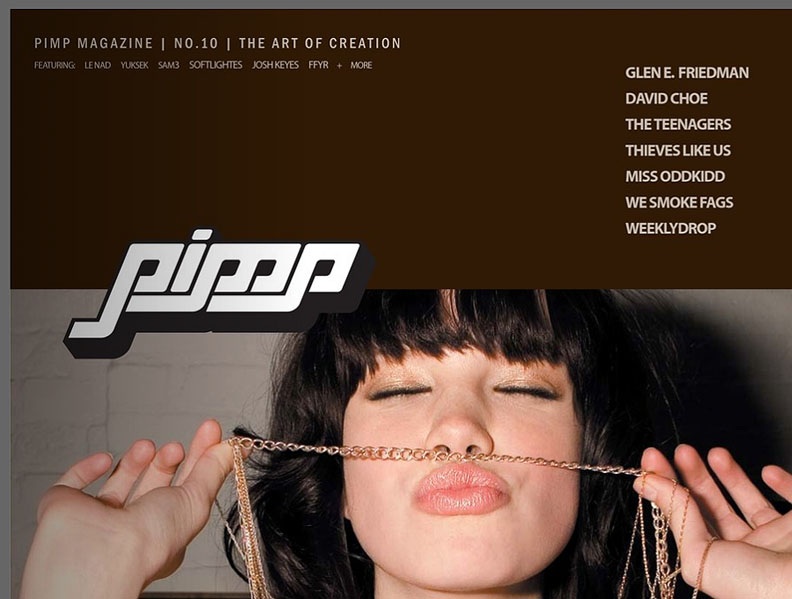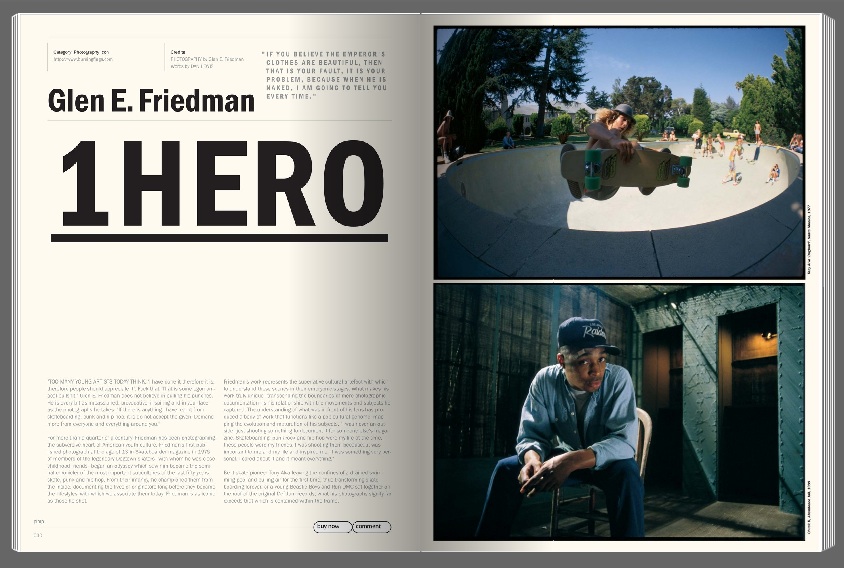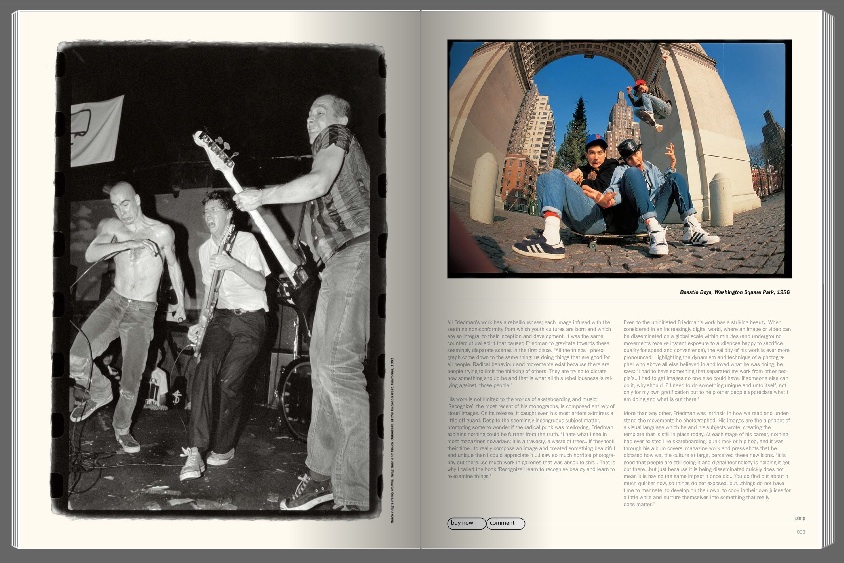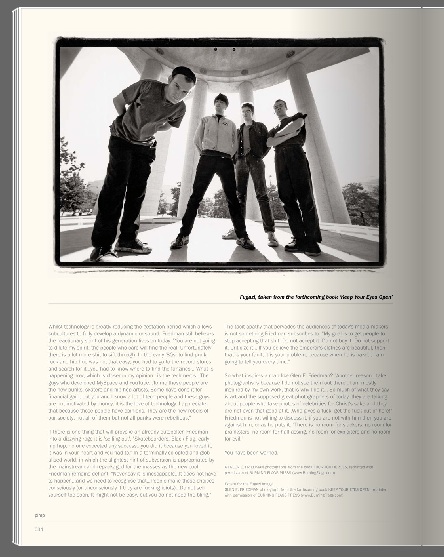PIMP
magazine
NO. 10 - THE ART OF CREATION
Spring/Summer 2007

"IF YOU BELIEVE THE EMPEROR'S CLOTHES ARE BEAUTIFUL, THEN THAT IS YOUR FAULT, IT IS YOUR PROBLEM, BECAUSE WHEN HE IS NAKED, I AM GOING TO TELL YOU EVERY TIME."
Glen E. Friedman
1 HERO
"TOO MANY YOUNG ARTISTS TODAY THINK, 'I have done it therefore it is, therefore people should appreciate it'. Fuck that. That is some egomaniacal bullshit." Glen E. Friedman does not believe in pulling his punches. He is every bit as impassioned, provocative, inspiring and in-your-face as the photographs he takes. "If there is anything I have learnt from skateboarding, punk and hip hop, it is do not accept the given. Demand more from everyone and everything around you."

For more than a quarter of a century, Friedman has been photographing the subversive heart of American youth culture. Friedman's first published photograph at the age of 13 in Skateboarder magazine in 1976 of members of the legendary Dogtown skaters-with whom he was close childhood friends-began an odyssey which saw him become the seminal chronicler of the most important subcultures of the last fifty years: skate, punk and hip hop. From their infancy, he championed them from the inside, documenting the lives of originators long before they became the 'lifestyles' with which we associate them today. Friedman is as iconic as those he shot.
Friedman's work represents the superlative cultural artefact with which to understand these scenes in their embryonic stages. What makes his work truly unique-transcending the boundaries of mere photographic documentation�is his relationship with the movements and subjects he captured. The understanding of what was in front of his lens has produced a body of work that functions like a pop-cultural genome, mapping the evolution and maturation of his subjects. "I was never an outsider just shooting something to document it for someone else's magazine. Skateboarding, punk rock and hip hop were my life at the time, these people were my friends. I was shooting them because...it was important to me and my life and inspired me. It was something very personal. I cared about it and it meant everything."

Be it skate pioneer Tony Alva leaving the confines of a drained swimming pool and pulling air for the first time, thus transforming skateboarding forever, or a young Beastie Boys and Run DMC sat together on the roof of the original Def Jam records, what his photographs signify far exceeds that which is contained within the frame.
All Friedman's work has a rebelliousness; each image infused with the seething non-conformity from which youth cultures are born and which are so integral to their inception and development. It was the same countercultural spirit that caused Friedman to gravitate towards these seemingly disparate scenes in the first place. "All the things I photograph come down to the same thing: us doing things that are good for all people. Radical behaviour and movements exist because there are people trying to limit the thinking of others. They are trying to dictate how something should be and that is what all this rebelliousness is rallying against, those people."
His work is not limited to the worlds of skateboarding and music; 'Recognize', the most recent of his monographs, is composed entirely of cloud images. On its release, it caught even his most ardent admirers a little off-guard. Despite the seemingly incongruous subject matter, prompting some to wonder if the radical punk was mellowing, Friedman explains nothing could be further from the truth. "I hate what I see in most magazines nowadays; it is a travesty, a waste of trees...If they took their time...to really compose an image and created something beautiful and unique then I could appreciate it ...I saw so much horrible photography out there...so much work in galleries that was absolute shit... That is why I called the book 'Recognize': learn to recognise beauty and learn to re-examine things."

Even to the uninitiated Friedman's work has a striking beauty. When considered in an increasingly digital world, where an image or video can be disseminated on a global scale within minutes (and underground movements receive instant exposure to audiences happy to sacrifice quality for speed and convenience), the validity of his work is ever more pronounced. Highlighting the dynamism and technique of a photographer who above all else believed in and loved what he was doing, he says: "I had to have something that separated my work from other people's... I had to get images no one else could have. If someone else can do it, why should I? I need to do something unique and unto itself, not only for my own gratification but to help other people appreciate what I am doing and what is out there."
More than any other, Friedman was intrinsic in how we read and understand the movements he photographed. His images are the alphabet of a visual language which he and his subjects wrote, creating the template that is still in place today. At each stage of his career, nothing had ever existed like skateboarding, punk rock or hip hop, and it was through his album covers, magazine work and press shots that he dictated how we, the culture at large, perceived these new icons. "It is good that people are still doing it and digital technology is helping it get out there�but just because it is being disseminated quickly does not mean it is having the same impact it once did... You do find out about it much quicker now, so things do get exposed, but... things do not have time to marinate, to develop on their own, to cook in their own juices for a little while and nurture themselves into something that really does matter."
Whilst technology is greatly reducing the gestation period which allows subcultures to fully develop a dynamic or sound, Friedman still believes the reactionary spirit of his generation lives on today. "You are not going to dilute my spirit, the people who care will find the real. Unfortunately there is a lot more shit to sift through. In the early '80s, to find punk rock and hip hop was not that easy; you had to go to the record stores and search for it... you had to know where to find the fanzines... What is happening now, which is closer in my opinion�is the tech nerds...The guys who developed MySpace and YouTube...To me those people are the new punks, skaters and hip hop artists. Some have done it for financial gain, but you and I know a lot of tech people and these guys are not motivated by money, it is the love of technology. I appreciate that because those people have opinions. They are the new rebels of our society; not all of them but not all punks were rebellious."
If there is one thing that will provoke an already outspoken Friedman into a dizzying rage it is 'selling out'. "Skateboarders, Black Flag, early hip hop, no one expected any success...you did it because you loved it, it was in your heart and you had to." In a terminally co-opted and globalised world, in which the slightest hint of subversion is appropriated by the mainstream and repackaged for the masses as the new cool, Friedman remains defiant. "Never say it is inescapable...It does not have to happen...and we need to recognise that...People make those choices consciously (or unconsciously if they are fucking idiots)...Do not sell yourself too soon. It might not be easy, but you do not need the bling."
The tacit apathy that pervades the audiences of today's media makers is not something Friedman subscribes to. "My goal is to get people to stop accepting that shit. Do not accept it. Do not buy it. Do not support it. Criticize it...If you believe the emperor's clothes are beautiful, then that is your fault, it is your problem, because when he is naked, I am going to tell you every time."
So what inspires a man like Glen E. Friedman? "Another reason I take photographs is because I do not see them out there...I am mostly inspired by my own work, that is why I do it... So much of what they say is art and the supposed great photographers of today, they are talking about people who take photos of celebrities for Christ's sake and they are not even that good at it... Who gives a fuck, get the fuck out of here!" Friedman is not willing to discuss it; if you are not with him then you are against him, or as he puts it: "There is no room for slackers, no room for pranksters, no room for half-assing, no room for exploiters and no room for evil."
You have been warned.
All GLEN E. FRIEDMAN photographs from the book FUCK YOU HEROES, reprinted with permission of BURNING FLAGS PRESS (www.BurningFlags.com) Except for the Fugazi image GLEN E. FRIEDMAN photograph from the forthcoming book KEEP YOUR EYES OPEN, reprinted with permission of BURNING FLAGS PRESS (www.BurningFlags.com)